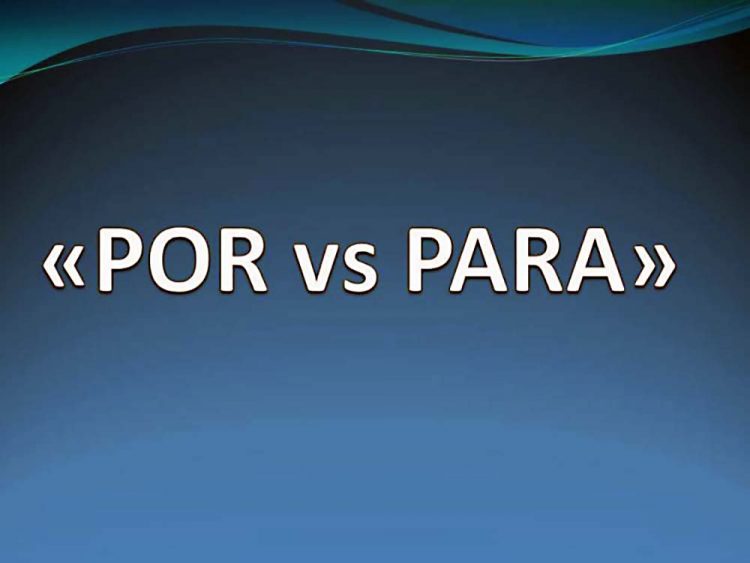✅ Por vs Para in Spanish: Clear Differences, Real Examples & Quiz
Choosing between “por” and “para” in Spanish can be confusing, especially if you’re trying to translate the English word “for” directly. But here’s the secret: Spanish doesn’t always follow English patterns, and sometimes neither por nor para is even needed!
Let’s break down how and when to use por and para, with clear rules, examples, and a quiz to test your skills at the end.
💡 When “for” in English doesn’t mean “por” or “para”
Before you worry about which one to use, consider:
- ✅ Some Spanish verbs already include the idea of “for” in their meaning.
- ✅ Some verbs require a specific preposition (por or para) to make sense.
- ✅ Some expressions vary depending on the region or country (like “estar por” vs “estar para”).
- ✅ Sometimes, you don’t need either por or para to express the idea correctly.
🎯 Por vs Para: Same Sentence, Different Meaning
Juan compró un regalo para María.
(Juan bought a gift to give to María.) → Recipient of the gift
Juan compró un regalo por María.
(Juan bought a gift on behalf of María.) → Substitution or reason
Limpié la casa para ti.
(I cleaned the house as a gift for you.) → Recipient of an action
Limpié la casa por ti.
(I cleaned the house in your place.) → Substitution of the doer

🔍 When to Use Para
| Use Case | Example | Meaning |
|---|---|---|
| 🎯 Destination | Este juguete es para mi hijo. | This toy is for my son. |
| 🎯 Purpose / Goal | Necesito gafas para leer. | I need glasses in order to read. |
| ⏳ Deadline / Time limit | Necesito el dinero para mañana. | I need the money by tomorrow. |
| ⚖️ Comparison | Para niño, tiene mucha experiencia. | For a child, he has a lot of experience. |
| 💬 Opinion | Para mí, tu opinión es importante. | For me, your opinion matters. |
| 👥 Capacity | Una mesa para tres personas. | A table for three people. |
💡 Some verbs demand “para”:
- Este cuchillo no sirve para nada.
(This knife is useless.)
🔍 When to Use Por
| Use Case | Example | Meaning |
|---|---|---|
| 🔄 Reason / Motive | Gracias por tu ayuda. | Thanks for your help. |
| 🕒 General Time | Estudio por la mañana. | I study in the morning. |
| ✈️ Means of transport | Enviamos el paquete por avión. | We sent the package by plane. |
| 📍 Location (around / through) | Camino por el parque. | I walk around the park. |
| 💸 Exchange | Cambié mi carro por otro nuevo. | I traded my car for a new one. |
| 📏 Unit / Measure | Venden las naranjas por docenas. | They sell oranges by the dozen. |
💡 Many verbs require “por”, such as:
- votar por, luchar por, morir por, pelear por, discutir por, agradecer por
✅ Summary: Quick Guide
| Concept | Por | Para |
|---|---|---|
| Cause / Reason | ✔ | |
| Purpose / Goal | ✔ | |
| In exchange for | ✔ | |
| Recipient | ✔ | |
| Duration / Time period | ✔ | |
| Deadline | ✔ | |
| Movement through | ✔ | |
| Destination | ✔ |
🧠 Take the Por vs Para Quiz!
🎯 Think you’ve got it?
Take our interactive quiz to test your skills and lock in what you’ve learned.
Don’t worry—it’s short, fun, and effective.
Thanks for taking the following quiz. We hope you improve your Spanish level.
🚀 Ready to Master Spanish Once and for All?
✅ Join hundreds of students already learning with us — online or in person in Nicaragua!
With unlimited access to engaging Spanish lessons, live Zoom classes, and a friendly native instructor with 28 years of experience,
you’ll learn faster and with real results. No tricks. Just solid progress.
🌟 Start Today for Only $169/Month!
Cancel anytime. No hidden fees.